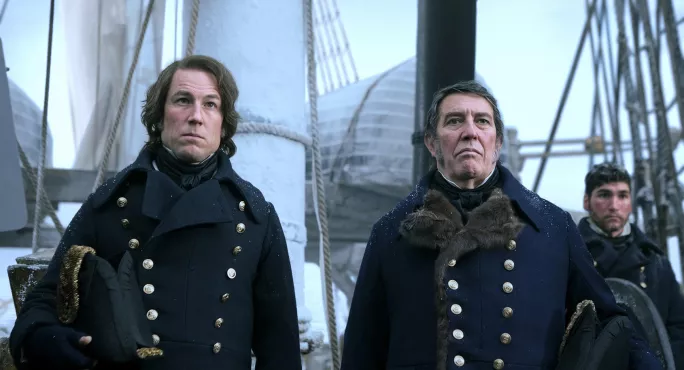
The Terror: What the TV drama tells us about leadership

Maybe it’s me, but one of the brightest joys of settling down for the Easter break is having time to scroll through the telly and see what I have been missing out on over the past busy term. This holiday, the programme that had me completely enthralled was BBC’s The Terror.
The Terror is an adaptation of a novel with the same name by Dan Simmons and provides a fictionalised account of what happened to the crew aboard the Terror and Erebus ships that vanished during an Arctic expedition in 1845. Not only was it a cracking story with incredible acting, it also initiated some ponderings in me about human nature and our behaviour during distress or chaos.
The Duke of Edinburgh: What his life can teach our students
The next FE commissioner: My core leadership principles
New FE commissioner: Principal Shelagh Legrave appointed
It caused me to consider different leadership styles in times of crisis and to dream up (very vague) parallels between navigating through an Arctic voyage and navigating a team in a college or a school through a pandemic. What can be learned about leadership in crisis from the characters in The Terror?
The Terror: Lessons in leadership
Captain Sir John Franklin: The experienced leader
The main man, the guy in charge, the expedition leader. This isn’t his first boat trip. In fact, it’s not even his first Arctic voyage and he has seen it all. He maintains order and rank, which, in turn, ensures that every crew member knows their role and knows what’s expected of them. He recognises the need to uphold high morale, leading with confidence and authority throughout. There’s no doubt the crew admire and respect Captain Franklin. His downfall: ignoring feedback and the knowledge of lesser ranking men and relying on his own experience at all costs. Dismissing their authority on the current situation and sticking to his own experience of the past proves a fatal error.
Commander James Fitzjames: The aspiring leader
Fitzjames has completed several voyages previously and feels pretty sure he can now lead a crew in the Arctic circle. Like his Captain, he believes in order and rank, but this is sometimes more to maintain his own place at the top of the pecking order. His first attempt at the top job involves him organising an Arctic shindig which results in the crew breaking rank and further perpetuating the chaos of their situation. Commander Fitzjames learns a hard lesson about perceptions of good leadership versus the reality of leadership in action. By the end of his character arc, he commands with respect, tolerance and care.
Caulker’s mate Cornelius Hickey: The rebel leader
Hickey is nothing like the others. He has spent his whole life hustling and this most recent hiccup is just another in the long line of dramas that have made up his life so far. He doesn’t like the order and ranking on board (particularly as he fears he may be lower down than Neptune, the ship dog), and he’s not that enamoured with social order in Victorian England full stop. Hickey wants change at a systematic level and he’s prepared to use whatever means necessary to make that happen. His small group of followers are loyal and are engaged by his charisma and confidence. The problem: his autocratic leadership style results in carnage on an epic scale and the subsequent disillusion of his followers. When he removes structure and respect from his group ideals, the wheels start to fall off.
Captain Francis Cozier: The marginalised leader
Captain Crozier is probably the most natural leader of our bunch, but, unfortunately, life hasn’t really gone his way. He is Irish, which has presented as quite a significant barrier in his career progression, and he finds himself sitting under a suffocating glass ceiling. He’s experienced and knowledgeable, he gives sound advice regarding the crisis unfolding and is consistently loyal to his crew. He believes in order, rank and discipline but never underestimates the importance of humanity and kindness. He displays self-sabotaging behaviours that sometimes lose him crew confidence, but, towards the end, we see his leadership is the balance between life and death. When he is present, the fight for survival continues. When he is absent, things become very unpleasant very quickly.
Sailing master Thomas Blanky: The reluctant leader
We all know a Thomas Blanky. He’s got more knowledge of sailing than the rest of the crew combined but he’s not interested in the top job - he wants to influence from the middle. If Franklin is steering the ship, Blanky is fueling the engine room. He’s selfless and brave, which mean he has the utmost respect from crew members across every rank on board. He’s not a senior leader but his actions show leadership across various levels throughout his character arc. He takes control of situations (taking on a mysterious danger.. twice!) and leads by example from the front whilst consistently giving essential advice to both his superiors and his inferiors.
Laura Lavender is head of inclusion at Wakefield College
You need a Tes subscription to read this article
Subscribe now to read this article and get other subscriber-only content:
- Unlimited access to all Tes magazine content
- Exclusive subscriber-only stories
- Award-winning email newsletters
- Unlimited access to all Tes magazine content
- Exclusive subscriber-only stories
- Award-winning email newsletters
You need a subscription to read this article
Subscribe now to read this article and get other subscriber-only content, including:
- Unlimited access to all Tes magazine content
- Exclusive subscriber-only stories
- Award-winning email newsletters
- Unlimited access to all Tes magazine content
- Exclusive subscriber-only stories
- Award-winning email newsletters